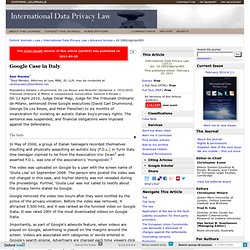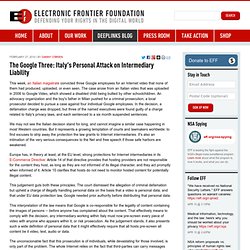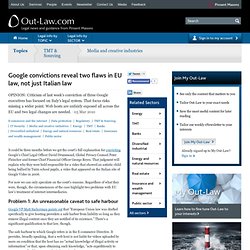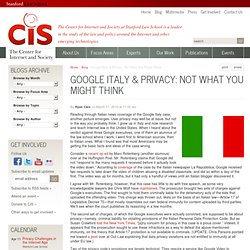

Google Italy Video.
Google liable for 'suggest search' results. Life is becoming increasingly difficult for search engine operators in Italy.

The Court of Rome recently issued a decision that raises serious questions about contributory liability for IP rights infringement (for further details please see "Yahoo! Italia liable for searchable content"). The Court of Milan has since issued another decision on search engine liability, this time with reference to potentially defamatory conduct arising from the use of the Google Suggest service. Cybercrime Laws. Larger Threat Is Seen in Google Case. Google Case in Italy. Repubblica Italiana v Drummond, De Los Reyes and Fleischer (Sentenza n. 1972/2010.

Tribunale Ordinario di Milano in composizione monocratica. Sezione 4 Penale.) On 12 April 2010, Judge Oscar Magi, Judge for the Tribunale Ordinario de Milano, sentenced three Google executives (David Carl Drummond, George De Los Reyes, and Peter Fleischer) to six months of incarceration for violating an autistic Italian boy's privacy rights. The sentence was suspended, and financial obligations were imposed against the defendants.
The facts In May of 2006, a group of Italian teenagers recorded themselves insulting and physically assaulting an autistic boy (F.D.L.) in Turin Italy. The Google Three: Italy's Personal Attack on Intermediary Liability. This week, an Italian magistrate convicted three Google employees for an Internet video that none of them had produced, uploaded, or even seen.

The case arose from an Italian video that was uploaded in 2006 to Google Video, which showed a disabled child being bullied by other schoolchildren. An advocacy organization and the boy's father in Milan pushed for a criminal prosecution; a local prosecutor decided to pursue a case against four individual Google employees. In the decision, a defamation charge was dropped, but three of the named executives were found guilty of a charge related to Italy's privacy laws, and each sentenced to a six month suspended sentences. We may not see the Italian decision stand for long, and cannot imagine a similar case happening in most Western countries. But it represents a growing temptation of courts and lawmakers worldwide: to find excuses to strip away the protection the law grants to Internet intermediaries. This judgement guts both these principles. Google convictions reveal two flaws in EU law, not just Italian law. It could be three months before we get the court's full explanation for convicting Google's Chief Legal Officer David Drummond, Global Privacy Counsel Peter Fleischer and former Chief Financial Officer George Reyes.

That judgment will explain why they were held responsible for a video that showed an autistic child being bullied by Turin school pupils, a video that appeared on the Italian site of Google Video in 2006. For now we can only speculate on the court's reasons. Regardless of what they were, though, the circumstances of the case highlight two problems with EU law's treatment of internet intermediaries. Problem 1: An unreasonable caveat to safe harbour Google VP Matt Sucherman points out that "European Union law was drafted specifically to give hosting providers a safe harbor from liability so long as they remove illegal content once they are notified of its existence.
" The safe harbour to which Google refers is in the E-commerce Directive. In Italian Google Case, American and European Ideas of Privacy Collide. In one sense, the ruling was a nice discussion starter about how much responsibility to place on services like Google for offensive content that they passively distribute.

But in a deeper sense, it called attention to the profound European commitment to privacy, one that threatens the American conception of free expression and could restrict the flow of information on the Internet to everyone. “Americans to this day don’t fully appreciate how Europeans regard privacy,” said Jane Kirtley, who teaches media ethics and law at the .
“The reality is that they consider privacy a fundamental human right.” Google understands. “The framework in Europe is of privacy as a human-dignity right,” said Nicole Wong, a lawyer with the company. But Ms. The three Google executives were sentenced to six months in prison for failing to block a video showing an autistic boy being bullied by other students. Google Italy & Privacy: Not What You Might Think. Reading through Italian news coverage of the Google Italy case, another picture emerges.

User privacy may well be at issue, but not in the way you probably think. I grew up in Italy and now research and teach Internet law in the United States. When I heard about the verdict against three Google executives, one of them an alumnus of the law school where I work, I went first to American sources, then to Italian ones. What I found was that most Americans may be getting the basic facts and ideas of the case wrong. Consider a recent op ed by Marc Rotenberg (another alumnus) over at the Huffington Post. I agree with Mr.
The second set of charges, of which the Google executives were actually convicted, are supposed to be about privacy—namely, criminal liability for violating provisions of the Italian Personal Data Protection Code. Two of the privacy code’s provisions are largely technical. Now Google can be a frustrating company. So then what is this case really about?